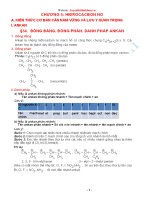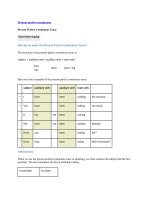lý thuyết ngữ pháp và bài tập về sở hữu cách
Bạn đang xem bản rút gọn của tài liệu. Xem và tải ngay bản đầy đủ của tài liệu tại đây (127.36 KB, 9 trang )
Possessive Nouns
Possessive nouns are used to indicate ownership.
Possessive nouns usually are formed by adding an apostrophe (') and s.
• John's book
• Kerry's car
• Grandma's mirror
When a noun is plural and ends in s, just add an apostrophe (').
• The kids' toys
• My parents' house
• The teachers' lounge
If two people own one thing, add the apostrophe and s to the second person only.
• John and Mary's new house
• David and Sue's wedding
• Tom and Doug's car
If two people own separate things, add the apostrophe and s for each person.
• Susan's and Beth's books
• Jean's and Dan's pants
• Ben's and Jim's offices
• Các cách diễn đạt quan hệ sở hữu
•
• Để diễn đạt quan hệ sở hữu, ta đã học tính từ sở hữu và đại từ sở hữu. Tuy nhiên,
nhiều khi quan hệ sở hữu không đơn giản chỉ là giữa các đại từ nhân xưng và danh từ
mà nó còn có thể là giữa ngữ danh từ và danh từ. Bài này sẽ chỉ cho bạn thêm các cách
còn lại để diễn đạt quan hệ sở hữu.
• Ngoài cách dùng tính từ sở hữu để diễn đạt quan hệ sở hữu, ta còn có các cách sau:
• * Cách thứ nhất: DÙNG OF
• - OF có nghĩa là CỦA khi được dùng để diễn đạt quan hệ sở hữu. (trong tiếng Việt, có
thể không cần viết CỦA cũng có thể hiểu được, nhưng trong tiếng Anh phải có OF)
• - Khi dùng OF thì danh từ "bị" sở hữu đứng đầu rồi đến OF rồi mới đến danh từ chủ sở
hữu
• - Ta thường dùng OF để diễn đạt quan hệ sở hữu khi danh từ "bị" sở hữu là danh từ
trừu tượng
• - Thí dụ:
• + THE BEGINNING OF THE MOVIE = phần đầu của bộ phim (phần đầu bộ phim)
• + THE SIZE OF THE PORTRAIT = Kích thước của tấm chân dung.
• * Cách thứ hai: không cần dùng gì cả, chỉ cần sắp xếp hai danh từ cạnh nhau
• - Ta dùng cách sắp xếp hai danh từ cạnh nhau để diễn đạt quan hệ sở hữu khi cả hai
danh từ này đều là danh từ cụ thể.
• - Để diễn đạt quan hệ sở hữu theo cách này thì thứ tự sắp xếp danh từ rất quan trọng:
DANH TỪ CHỦ SỞ HỮU ĐỨNG TRƯỚC DANH TỪ "BỊ" SỞ HỮU.
• - Thí dụ:
• + THE CAR RADIO = Máy radio của xe hơi
• + THE TREE TRUNK = Thân của cây (thân cây)
• * Cách thứ ba: dùng Sở Hữu Cách với 'S
• - Ta đã biết 'S có thể là viết tắt của IS hoặc HAS. Giờ đây ta cần biết thêm 'S ngay sau
một danh từ có khi không phải là dạng viết tắt của ai mà nó là một phương cách để diễn
đạt quan hệ sở hữu giữa hai (ngữ) danh từ.
• - Cách dùng 'S để diễn đạt quan hệ sở hữu:
• + Thông thường, ta chọn cách dùng 'S để diễn đạt quan hệ sở hữu khi hai (ngữ) danh
từ nói về người hoặc con vật. Tuy nhiên, 'S có thể dùng cho sự vật khi nó được nhân
cách hóa (ta coi nó như con người) hoặc cho các đơn vị thời gian hoặc trong những câu
thành ngữ.
• + Thí dụ:
• THE BOY'S HAT = cái nón cùa thằng nhỏ
• PETER'S CAR = Xe hơi của Peter
• THE EARTH'S SURFACE = Bề mặt của trái đất
• A DAY'S WORK = Công việc của một ngày
• - Vài điều cần lưu ý:
• + Khi dùng 'S, ta phải theo thứ tự sau:
• Danh từ làm chủ sở hữu'S + Danh từ bị sở hữu
• + Nếu danh từ làm chủ sở hữu là một ngữ danh từ dài cũng không sao, cứ thêm 'S ngay
sau chữ cuối cùng trong ngữ danh từ đó, ví dụ:
• MY SISTER-IN-LAW'S CHILDREN = Những người con của chị dâu tôi (hoặc em dâu tôi
vì sister có thể là chị gái hoặc em gái, brother có thể là anh trai hoặc em trai)
• + Nếu bản thân danh từ làm chủ sở hữu tận cùng bằng S rồi thì ta chỉ cần thêm ' đằng
sau nó thôi, khỏi thêm S.
• THE STUDENTS' BOOKS = những cuốn sách của các sinh viên/học sinh
• THE SMITHS' HOUSE = Căn nhà của gia đình họ SMITH.
• DICKENS' NOVELS = Những cuốn tiểu thuyết của ông DICKENS (tên ông ta có S đằng
sau)
EXERCISE 1:
Possessive Case
Fill the gaps with the possessive case of nouns. Decide whether you have to use 's or
an of phrase.
1. The boy has a toy. → It's the .
2. Peter has a book. → It's .
3. The magazine has my picture on its cover. → My picture is on .
4. Our friends live in this house. → It's .
5. There is milk in the glass. → It's .
6. This house has a number. → What is ?
7. The walk lasts two hours. → It's .
8. John has a sister, Jane. → Jane is .
9. The film has a name, "Scream". → "Scream" is .
10. This school is for girls only. → It's a .
Possessive Case
Fill the gaps with the possessive case of nouns. Decide whether you have to use 's or
an of phrase.
1. The boy has a toy. → It's the boy's toy .
2. Peter has a book. → It's Peter's book .
3. The magazine has my picture on its cover. → My picture is on the cover of the magazine
.
4. Our friends live in this house. → It's our friends' house .
5. There is milk in the glass. → It's a glass of milk .
6. This house has a number. → What is the number of this house ?
7. The walk lasts two hours. → It's a two-hours' walk .
8. John has a sister, Jane. → Jane is John's sister .
boy's toy
9. The film has a name, "Scream". → "Scream" is the name of the film .
10. This school is for girls only. → It's a girls' school .
EXERCISE2:
Fill in the gaps with a form of the verb to be and the possessive form of a noun, so that the sentences on the right
mean the same as the ones on the left. Number 1 is already done for you:
1. This backpack belongs to Jeremy. This backpack is Jeremy's.
2. That bicycle belongs to Rebecca.
That bicycle .
3. This watch belongs to my father.
This watch.
4. That car belongs to the plumber.
That car.
5. Those glasses belong to Mrs. Jackson.
Those glasses .
6. That house belongs to my grandparents.
That house.
7. These suitcases belong to Matthew.
These suitcases.
8. This camera belongs to our friends.
This camera.
9. These books belong to the teacher.
These books.
10.These books belong to the teachers.
These books.
11. These gloves belong to the gardener.
These gloves .
12. That calculator belongs to Samantha.
That calculator .
EXERCISE 3:
1) This is book. (Peter)
2) Let's go to the . (Smiths)
3) The room is upstairs. (children)
4) sister is twelve years old. (John)
5) and school is old. (Susan - Steve)
6) shoes are on the second floor. (men)
7) My car was not expensive. (parents)
8) CD player is new. (Charles)
9) This is the bike. (boy)
10) These are the pencils. (boys)
1) This is Peter's book.
2) Let's go to the Smiths'.
3) The children's room is upstairs.
4) John's sister is twelve years old.
5) Susan and Steve's school is old.
6) Men's shoes are on the second floor.
7) My parents' car was not expensive.
8) Charles's CD player is new.
9) This is the boy's bike.
10) These are the boys' pencils.
EXERCISE 3: Study the following:
Rule 1:
Singular nouns show possession by adding an apostrophe and s ('s) no
matter what letter it ends with.
Examples:
a girl's dress
Anna's letter
a baby's crib
Rule 2:
Plural nouns that end in s or z show possession by adding an apostrophe
only (').
Examples:
boys' shoes
girls' sewing boxes
wives' budgets
Mr. Velez' sons
Rule 3:
Plural nouns that do not end in s show possession by adding an apostrophe
and s ('s).
Examples:
women's club
children's games
men's tools
Rule 4:
When you are showing possession with compounded nouns, the apostrophe's
placement depends on whether the nouns are acting separately or together.
Examples:
Miguel's and Cecilia's new cars are in the parking lot.
This means that each of them has at least one new car and that their
ownership is a separate matter.
Miguel and Cecilia's new cars are in the parking lot.
This construction tells us that Miguel and Cecilia share ownership of these
cars. The possessive (indicated by 's) belongs to the entire phrase, not just
to Cecilia.
Exercise 1
What is the possesive form of these singular nouns?
Example:
1. child - child's mother
2. boy - _________ pants
3. girl - _________ book
4. baby - _________ bottle
5. Maria - ________ party dress
6. fairy - _________ wings
7. knife - _________ blade
8. Mr. Smith - _________ wife
Exercise 2
What is the possessive form of these plural nouns?
Example:
1. boys - boys' projects
2. girls - _________ bags
3. pirates - _________ cave
4. horses - _________ hoofs
5. thieves - _________ loots
6. fairies - _________ wands
7. birds - _________ nests
8. hens - _________ eggs
Exercise 3
Choose the correct possessive form
1. One (hour's, hours') sleep is good enough for me in the afternoon.
2. Babies need many (hour's, hours') sleep.
3. The (children's, childrens') mother died last week.
4. The (thieves', thieve's) loot were found in a cave.
5. We enjoyed the edible (bird's, birds') nest soup.
6. There are (gypsies', gypsie's) tents among the trees.
7. Have you answered Uncle (John's, Johns') letter?
8. How much does your father receive for a (day's, days') work?
9. The (rebels', rebel's) arms were confiscated.
10. (Father's, Fathers') new car was stolen.
11. (Duck's, Ducks') eggs are bigger than the hen's eggs.
12. The (lions', lions's) usual source of water has dried up.
13. She plans on opening a (women's, womens') clothing shop.
14. (Cara and Susan's, Cara's and Susan's) project impressed the professor.
15. Do all of your (wishes, wishes') come true?
16. You must consider (other's, others') feelings before embarassing them
for an easy laugh.
17. Water the (trees, tree's) but not every day.
18. The (singers,singer's) agreed to dress in black.
19. The (student's, students') attempts to solve the problem were rewarded.
20. The forest (ranger's, rangers') truck is painted an ugly shade of green.









